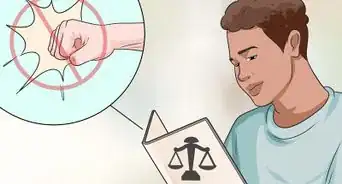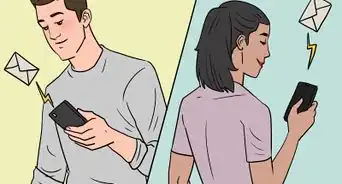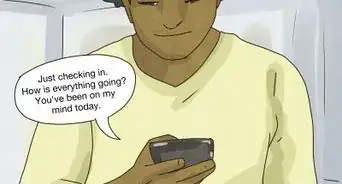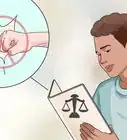This article was co-authored by Tara Vossenkemper, PhD, LPC and by wikiHow staff writer, Megaera Lorenz, PhD. Dr. Tara Vossenkemper is a Licensed Professional Counselor and the Founder and Managing Director of The Counseling Hub, LLC, a group counseling practice located in Columbia, Missouri. She is also the Founder of and a Business Consultant with Tara Vossenkemper Consulting, LLC, a consulting service for therapy practice owners. With over nine years of experience, she specializes in using the Gottman Method of relationship therapy with couples on the brink of divorce, who have conflict, or who feel disconnected from one another. Dr. Vossenkemper holds a BA in Psychology from The University of Missouri, Saint Louis, an MA in Counseling from Missouri Baptist University, and a PhD in Counselor Education and Supervision from The University of Missouri, Saint Louis. She has also completed Level 3 training in the Gottman Method Couples Therapy approach and has been formally trained in both the Prepare-Enrich Premarital Couples Counseling approach and the PREP Approach for couples counseling.
There are 16 references cited in this article, which can be found at the bottom of the page.
This article has been viewed 104,871 times.
If you suspect that your partner is cheating and you’re considering confronting them, you might wonder what they’ll do—and if their reaction will give you the clues you’re looking for. Since everyone is different, there are a variety of ways they might respond. In this article, we’ll go over a few of the most common ways that cheaters react when confronted.
Steps
Expert Q&A
-
QuestionHow would an innocent person react when accused of cheating?
 Tara Vossenkemper, PhD, LPCDr. Tara Vossenkemper is a Licensed Professional Counselor and the Founder and Managing Director of The Counseling Hub, LLC, a group counseling practice located in Columbia, Missouri. She is also the Founder of and a Business Consultant with Tara Vossenkemper Consulting, LLC, a consulting service for therapy practice owners. With over nine years of experience, she specializes in using the Gottman Method of relationship therapy with couples on the brink of divorce, who have conflict, or who feel disconnected from one another. Dr. Vossenkemper holds a BA in Psychology from The University of Missouri, Saint Louis, an MA in Counseling from Missouri Baptist University, and a PhD in Counselor Education and Supervision from The University of Missouri, Saint Louis. She has also completed Level 3 training in the Gottman Method Couples Therapy approach and has been formally trained in both the Prepare-Enrich Premarital Couples Counseling approach and the PREP Approach for couples counseling.
Tara Vossenkemper, PhD, LPCDr. Tara Vossenkemper is a Licensed Professional Counselor and the Founder and Managing Director of The Counseling Hub, LLC, a group counseling practice located in Columbia, Missouri. She is also the Founder of and a Business Consultant with Tara Vossenkemper Consulting, LLC, a consulting service for therapy practice owners. With over nine years of experience, she specializes in using the Gottman Method of relationship therapy with couples on the brink of divorce, who have conflict, or who feel disconnected from one another. Dr. Vossenkemper holds a BA in Psychology from The University of Missouri, Saint Louis, an MA in Counseling from Missouri Baptist University, and a PhD in Counselor Education and Supervision from The University of Missouri, Saint Louis. She has also completed Level 3 training in the Gottman Method Couples Therapy approach and has been formally trained in both the Prepare-Enrich Premarital Couples Counseling approach and the PREP Approach for couples counseling.
Licensed Professional Counselor They would probably feel concerned and worried. It's very possible that the person wants to understand why their partner is curious if they're having an affair. As the accused, they would want to make their partner feel better.
They would probably feel concerned and worried. It's very possible that the person wants to understand why their partner is curious if they're having an affair. As the accused, they would want to make their partner feel better. -
QuestionHow can you tell if someone is guilty of cheating?
 Tara Vossenkemper, PhD, LPCDr. Tara Vossenkemper is a Licensed Professional Counselor and the Founder and Managing Director of The Counseling Hub, LLC, a group counseling practice located in Columbia, Missouri. She is also the Founder of and a Business Consultant with Tara Vossenkemper Consulting, LLC, a consulting service for therapy practice owners. With over nine years of experience, she specializes in using the Gottman Method of relationship therapy with couples on the brink of divorce, who have conflict, or who feel disconnected from one another. Dr. Vossenkemper holds a BA in Psychology from The University of Missouri, Saint Louis, an MA in Counseling from Missouri Baptist University, and a PhD in Counselor Education and Supervision from The University of Missouri, Saint Louis. She has also completed Level 3 training in the Gottman Method Couples Therapy approach and has been formally trained in both the Prepare-Enrich Premarital Couples Counseling approach and the PREP Approach for couples counseling.
Tara Vossenkemper, PhD, LPCDr. Tara Vossenkemper is a Licensed Professional Counselor and the Founder and Managing Director of The Counseling Hub, LLC, a group counseling practice located in Columbia, Missouri. She is also the Founder of and a Business Consultant with Tara Vossenkemper Consulting, LLC, a consulting service for therapy practice owners. With over nine years of experience, she specializes in using the Gottman Method of relationship therapy with couples on the brink of divorce, who have conflict, or who feel disconnected from one another. Dr. Vossenkemper holds a BA in Psychology from The University of Missouri, Saint Louis, an MA in Counseling from Missouri Baptist University, and a PhD in Counselor Education and Supervision from The University of Missouri, Saint Louis. She has also completed Level 3 training in the Gottman Method Couples Therapy approach and has been formally trained in both the Prepare-Enrich Premarital Couples Counseling approach and the PREP Approach for couples counseling.
Licensed Professional Counselor The only surefire way is to get them on the act or get a confession. That said, there are a couple of signs that can point to cheating, such as taking their phone with them everywhere and locking it behind a password. Sudden changes in behavior are usually another telltale sign.
The only surefire way is to get them on the act or get a confession. That said, there are a couple of signs that can point to cheating, such as taking their phone with them everywhere and locking it behind a password. Sudden changes in behavior are usually another telltale sign.
References
- ↑ https://psychcentral.com/blog/sex/2017/05/infidelity-and-gaslighting-when-cheaters-flip-the-script
- ↑ https://time.com/5443204/signs-lying-body-language-experts/
- ↑ https://www.psychologytoday.com/us/blog/the-mindful-self-express/202106/5-go-tactics-gaslighters-and-how-resist-them
- ↑ https://www.bannerhealth.com/healthcareblog/teach-me/stonewalling-is-it-ruining-your-relationship
- ↑ Tara Vossenkemper, PhD, LPC. Licensed Professional Counselor. Expert Interview. 18 January 2022.
- ↑ https://www.today.com/health/he-cheating-me-8-warning-signs-never-ignore-t78406
- ↑ https://www.psychologytoday.com/us/blog/attraction-evolved/201905/justifying-infidelity
- ↑ https://theconversation.com/cheaters-use-cognitive-tricks-to-feel-good-about-themselves-20447
- ↑ https://www.psychologytoday.com/us/blog/love-and-sex-in-the-digital-age/201908/the-6-most-common-excuses-men-make-cheating
- ↑ https://theconversation.com/cheaters-use-cognitive-tricks-to-feel-good-about-themselves-20447
- ↑ https://www.goodtherapy.org/learn-about-therapy/issues/infidelity
- ↑ https://time.com/5411624/how-to-tell-if-being-manipulated/
- ↑ https://www.psychologytoday.com/us/blog/here-there-and-everywhere/201906/why-does-your-partner-constantly-cheat
- ↑ http://content.time.com/time/arts/article/0,8599,1820942,00.html
- ↑ https://www.psychologytoday.com/us/blog/make-it-right/202010/how-recognize-and-respond-fake-apology
- ↑ https://www.sciencefocus.com/the-human-body/five-ways-to-get-anyone-to-tell-you-the-truth-plus-find-out-who-the-most-likely-liars-are/
- ↑ https://www.nbcnews.com/better/lifestyle/how-repair-your-relationship-after-someone-cheats-ncna980776






































































